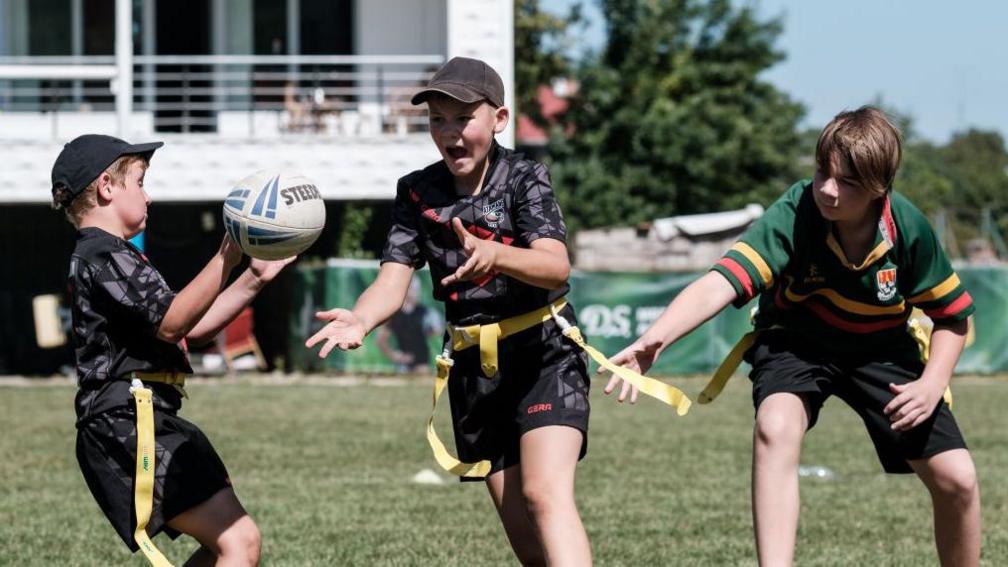New style of 'tag rugby' launched for schools

It is common for young people to play tag rugby as it requires less contact and causes fewer injuries.
- Published
A new non-contact style of rugby union is going to be introduced in some schools in England.
The Rugby Football Union (RFU), who oversee the sport in England, wants T1 rugby to give more young people the chance to play the game.
It comes after a big drop in the number of schools offering the sport because of worries about injuries and the fact it is a difficult game to introduce to young people.
The RFU say they aim to have 5,000 schools playing T1 Rugby within the next four years.
So what's it all about?
- Published30 September 2021
- Published26 September 2017
- Published21 January 2023
How do you play T1 rugby?
The new style of rugby includes less contact than previous versions of the game
The new format, called T1, will feature seven-a-side teams playing 20 minute matches (10 minutes per half) on smaller pitches.
There are similarities to touch or tag rugby where players must tap opponents on the shoulder or below, OR rip one of the tags from their opponent's waist belt.
No tackling is allowed but lineouts, scrums and kicking are included.
The only way to score in T1 rugby is by scoring a try - touching the ball on or over your opponent's line.
It aims to be simpler than 15-a-side rugby union where there are multiple ways to score, including penalties, conversions and drop goals.
The rules can be adapted to suit ages, abilities, number of players and genders.
You can have mixed gender teams and the size of the pitch can also be increased to suit the players involved.
What's the problem?
Complicated rules and a lack of accessibility are putting young people off taking up rugby, according to a recent review of the sport in England.
The review also found there is a perception in England that rugby union is a sport for "posh white boys" and the sport was struggling to attract a diverse range of young players.
This was highlighted as more than two thirds of the 2024 England's Six Nations squad had some form of private education (independent schools that charge fees to attend), compared to a much smaller number for football.
But a recent review shows participation has fallen in private schools too.
"This is a moment for change"
Mixed teams and less contact - would these new rules make you want to take up rugby?
Sir Jon Coles, chief executive of national schools group United Learning, who led the review, said: "This is a moment for change. The RFU must now take bold steps to make sure that schools with a strong rugby tradition want to play rugby and other schools want to join in.
"There is enormous potential for the growth of a game which is now played and loved by players of both sexes, all skin colours, all economic backgrounds and all shapes and sizes – but historically hasn't reached this whole population.
"This is a critical time to take action and make it as easy and appealing as possible for schools to add rugby to their offering."
